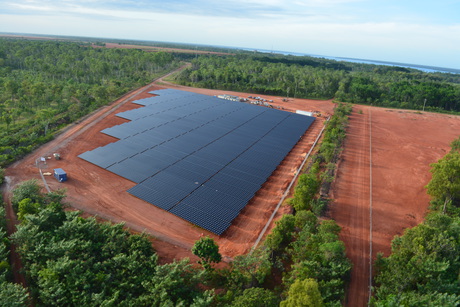Commercial diesel displacement solar plant starts operation

Australia’s first commercial diesel displacement solar plant, the Weipa Solar Plant, has successfully commenced commercial operation at a remote mine. The plant utilises equipment from First Solar and has been supported by the Australian Renewable Energy Agency (ARENA).
The solar plant will generate electricity for Rio Tinto’s Weipa bauxite mine, processing facilities and township on the Western Cape York Peninsula in Queensland. It is expected to produce an average of 2800 MWh of electricity per year.
“At peak output, the 1.7 MW capacity solar plant has the capacity to generate sufficient electricity to support up to 20% of the township’s daytime electricity demand,” said Rio Tinto General Manager Weipa Operations Gareth Manderson.
“We expect the energy from the solar plant will help reduce the diesel usage at Weipa’s power stations and save up to 600,000 litres of diesel each year. This will reduce Weipa’s greenhouse gas emissions by around 1600 tonnes per year — equivalent to removing around 700 cars.”
The electricity from the 18,000 advanced First Solar photovoltaic (PV) modules that have been connected to Rio Tinto’s existing mini-grid will be purchased by Rio Tinto under a 15-year power purchase agreement. According to Manderson, “This power purchase arrangement is an opportunity to trial the introduction of an alternative power source such as a solar plant into a remote electrical network like the one here in Weipa.”

First Solar’s FuelSmart solutions combine PV generation with a fossil fuel engine generator to provide optimal fuel savings while maintaining system reliability. As noted by First Solar Regional Manager for Asia Pacific Jack Curtis, the Weipa Solar Plant “provides the opportunity to demonstrate that PV-diesel hybrid projects can also be as reliable as stand-alone diesel-powered generation”.
“In recent years, attention has been focused on the technical challenges of high-penetration PV-diesel hybrids,” Curtis continued. “At the Weipa Solar Plant, First Solar is seeking to deliver a reliable electricity supply without diverting capital costs away from Rio Tinto’s critical mine operations. Proving this commercial model has the potential to be a watershed moment for the diesel hybrid application globally.”
“This is the first time a remote Australian mining operation has been supplied with power from solar PV on such a scale,” added ARENA CEO Ivor Frischknecht. “The success of phase one is set to create a precedent for industry by demonstrating that solar PV is a viable option for powering off-grid locations, like mine sites, in Australia.
“ARENA was pleased to provide an initial $3.5 million for this early mover project and up to $7.8 million is available for the second phase. Similar ARENA-supported projects now underway, or in the pipeline, will build on this landmark project to further prove the reliability of integrating renewable energy solutions in off-grid locations while helping to drive down costs and the need for subsidy.”
Contingent on the success of phase one, the project partners have the option of entering into a second phase that would include a storage component. At 6.7 MW, the expanded plant would have the potential to save approximately 2,300,000 litres of diesel each year.
Solar cell achieves world record for efficiency
University of Queensland researchers have set a world record for solar cell efficiency with...
Boral secures grant for cement kiln carbon reduction
The project will reduce process emissions from cement clinker manufacturing by up to...
Vast secures grant to progress SA Solar Fuels project
HyFuel Solar Refinery, a subsidiary of Vast, has been awarded $700,000 through the ASLET...










